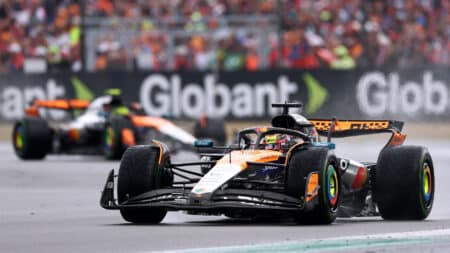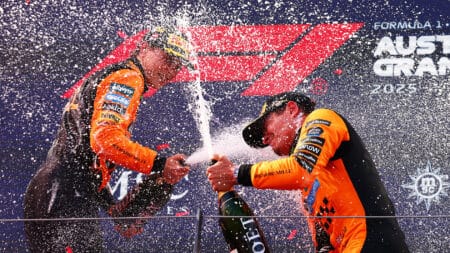
Horner's departure shows age of the maverick F1 boss is over
Christian Horner has now left Red Bull, the last of a certain breed of F1 team principal
I recently spent a week in Japan attending the Tokyo Motorshow and, among other less relevant things, driving the new Honda Civic Type-R. And when I explained the mechanics of such a trip to a friend, including the fact that Honda bought my plane ticket and paid for my hotel room, he enquired without a hint of mischief, ‘in exchange for which you write nice things about their cars?’

Andrew tests the Ford Fiesta ST
I should have been shocked but I wasn’t at all. It’s nothing anyone who earns their living this way hasn’t heard many times before. I think there is a general perception out there that the relationship between those who make cars and those who write about them is altogether too cosy: once or twice a year someone will sidle up to me at an event and say ‘I’ve just read your review of the such and such. Now tell me what you really thought.’
I do however understand how these misconceptions appear. I am not saying there’s no dodgy behaviour out there, but in my die-hard enthusiast corner of dedicated motoring media, it’s not even an issue. What is an issue is that unlike, for instance, mainstream journalism written by dispassionate hacks, we love cars.
We’d not be very good at our jobs if we did not. That means we feel instinctively well disposed towards them. I want every new car I climb aboard to be good and, if it is, I’ll take more pleasure in being able to say so than someone who’d not care if he or she were writing about a car, a watch, a film or a dishwasher.
Secondly, cars are still getting better and at an astonishing rate, which is not something I think you can say about watches, films or, in my experience, even dishwashers. If you bought a BMW 320d 15 years ago, it would take almost 10sec to hit 62mph, reach less than 130mph and return fewer than 50mpg.

Andrew puts the Jaguar F-type through its paces
Today its successor take 7.5sec to reach 62mph, does almost 150mph yet by the same measure will return over 60mpg. Now try and think of anything else that is still progressing at such a rate over 125 years after its invention. So given that cars are still improving so fast, no-one should be too surprised when we say so. But it also means that when they fail to significantly advance their art, it is doubly disappointing.
For some motoring journalists finding the balance is difficult. Unless you have a face for television (or the internet) this is not a business in which to make your fortune. Junior road testers may swan around the place in Porsches and Ferraris but they’d earn a far better living driving a train.
If they are freelance (as many now are because falling magazine sales have forced publishing companies to decimate their workforces) they may well dwell upon the likelihood or otherwise of being invited to the next launch by a car manufacturer whose most recent product they’ve just kicked into touch.
But the biggest problem by far – and the reason positive reviews so overwhelmingly outnumber negative reviews – is that many people who write about cars don’t actually know one end of said car from the other.
This is where you need to draw the distinction between motoring journalists and journalists who spend some of their time writing about motoring. The absolute basic requirements for a reliable car review include an ability to drive to a standard that will allow you to evaluate the car and also be able to carry out that evaluation.
You then need to be able to communicate those thoughts in a way that is both accurate and informative. Ideally it will also be entertaining. And you can’t do any of this without comprehensive knowledge of every other car on sale that may legitimately be considered an important rival.
Compared to rocket science or brain surgery this is not an impressive skill set to possess; but it is an unusual one. So those who find it difficult to reach reliable conclusions will incline towards giving the car the benefit of the doubt if they haven’t already read someone else’s review of the same car and copied their view instead.
Or sometimes they’ll do something quite a lot worse. One of the arts of writing a press release is to phrase it in such a way that alleged journalists can ‘lift’ it wholesale and publish it as editorial. It happens in the local press more than you might appreciate: you think you’re reading an objective review when in fact it’s an opening sentence or two of original thought pasted onto the front of a press release written by the car manufacturer.
More road cars with Andrew Frankel
Honda is back
BMW’s i3 leads the electric car field
Charles will be missed at Morgan
The good news is that quality motoring journalism is alive and well: pick up a well respected motoring magazine like Car, Evo, Autocar or, dare I say Motor Sport and you’ll know the views stated are sincerely held and the result in most cases of years if not decades of experience.
So to answer the questions posed at the start of this blog, the reason every journalist on every car launch has all their accommodation and travel costs paid for by the manufacturer hosting the launch is not in exchange for writing nice things about their product, rather that none of us could afford to attend if they did not. Their products would go un-reviewed.
As for what I really think about any given car, there is no reading between the lines to be done: like every half decent motoring journalist I know, I report as find. Always have, always will.

Christian Horner has now left Red Bull, the last of a certain breed of F1 team principal

Was Oscar Piastri the real winner in the long run after Silverstone? asks James Elson

Lewis Hamilton hadn't won in almost three years – and then produced a sensational victory at Silverstone 2024. James Elson explains why it was his best ever

Describing this year's championship race as a 'battle' might be slightly over-egging it, writes James Elson